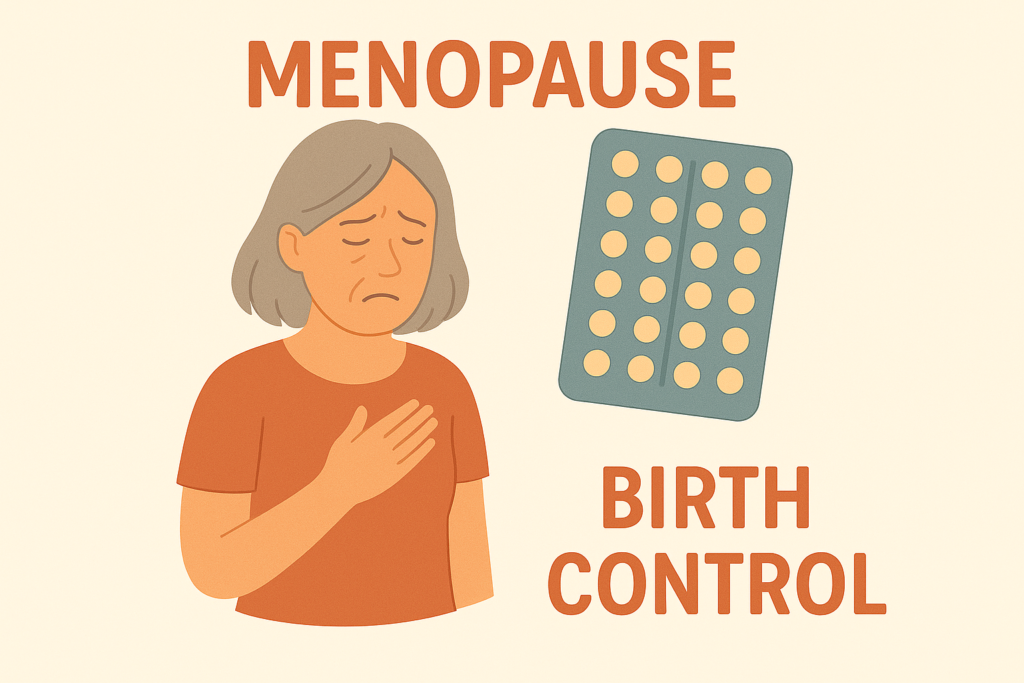
Introduction:
Many women in Ontario and across Canada are on hormonal birth control well into their 40s and 50s, not realizing that these medications can mask the symptoms—and even the timing—of menopause. If you’re still on “the pill,” patch, or ring in your 50s, you may already be in perimenopause or even postmenopause and not know it.
This post breaks it all down:
- How hormonal birth control affects your cycle
- How to know if you’re in menopause
- What hormone testing can reveal
- What your treatment options are—including hormone therapy
- Real stats, real solutions, and what women in Ontario need to know now
1. Birth Control and Menopause: A Hidden Overlap
Hormonal birth control (like the pill, patch, or ring) regulates your menstrual cycle artificially by providing synthetic estrogen and/or progesterone. As a result:
- You still bleed monthly—but it’s a withdrawal bleed, not a true period.
- The synthetic hormones override your natural cycle, meaning your body may have already stopped ovulating without you realizing it.
- This makes it impossible to track the 12-month no-period rule that defines menopause.
So, while it may look like everything is normal, you could already be in perimenopause or menopause without knowing it.
2. Understanding the Stages:
Let’s clarify the terms:
- Perimenopause: The transition years before menopause. Hormones fluctuate, causing symptoms like hot flashes, irregular cycles, mood changes, and sleep problems.
- Menopause: Officially defined as the 12-month mark without a period. The average age in Canada is 51, according to the Society of Obstetricians and Gynaecologists of Canada (SOGC).
- Post-Menopause: The stage after menopause. Periods are gone, and hormone levels remain low. Risks of osteoporosis and heart disease increase during this phase.
3. How Common Is This?
In Canada:
- 23% of women aged 40–55 are still using hormonal contraception.
- In Ontario, over 50% of women aged 45–54 reported being unsure if they were in menopause, according to 2022 data from Women’s Health in Women’s Hands CHC.
- Many women are prescribed the pill to manage symptoms like heavy periods or migraines, which may also disguise the underlying transition to menopause.
4. How Do You Know If You’re in Menopause If You’re Still on the Pill?
This is where hormone testing comes in.
If you’re 50+ and stop taking birth control and your period doesn’t return, your doctor may order menopausal blood tests such as:
- FSH (Follicle-Stimulating Hormone): Typically rises sharply in menopause. A level over 30 IU/L is a strong indicator.
- Estradiol (a form of estrogen): Usually low (<30 pg/mL) in menopause.
- LH (Luteinizing Hormone): Also increases after menopause.
- AMH (Anti-Müllerian Hormone): Optional, this hormone declines as ovarian reserve is depleted.
Your doctor will also assess:
- Age
- Symptoms (hot flashes, vaginal dryness, etc.)
- Period history, if available
5. Should You Stop Birth Control to See Where You Are?
This should be done under medical supervision, but yes:
- Many doctors recommend stopping birth control around age 50–52 to assess natural hormone levels.
- After stopping, if your period doesn’t return within 3–6 months, you may be in menopause.
- If symptoms flare up (hot flashes, night sweats), that’s also a sign your natural hormones have dropped.
Note: If you’re still at risk of pregnancy, non-hormonal options like copper IUD or condoms may be recommended during the transition.
6. What Are Your Options After Birth Control?
If hormone tests confirm menopause, here are your choices:
A. Hormone Therapy (HT or HRT)
Prescribed if symptoms affect quality of life.
- Estrogen replaces what your body no longer makes.
- Progesterone (or a progestin) is given to protect the uterus.
- Available as pills, patches, gels, vaginal creams, or rings.
- In Ontario, some HT options are covered under OHIP+ for women under 65, or under private insurance plans.
B. Non-Hormonal Therapies
- SSRIs or SNRIs for hot flashes and mood
- Gabapentin for sleep issues
- Lifestyle approaches (diet, exercise, cognitive behavioral therapy)
C. Vaginal Estrogen (Local)
- For dryness and painful sex
- Doesn’t affect the whole body—safe for most women, even those with a history of breast cancer
7. What You Should Do Next
If you’re 50+ and still on birth control, take the following steps:
- Talk to your doctor about safely coming off the pill to assess your natural cycle.
- Request hormone tests if periods don’t return or you experience menopause symptoms.
- Track your symptoms using a menopause journal or app.
- Review treatment options and risks with your provider.
8. Key Takeaways for Ontario Women
- Birth control can mask menopause for years.
- If you’re in your 50s, consider assessing your menopause status—even if you’re still bleeding.
- Hormone testing (FSH, estradiol, etc.) can confirm menopause if periods are not a guide.
- Hormone therapy can be safe and effective for most healthy women under 60, including in Ontario.
- Post-menopause care should include bone health, heart health, and symptom support.
Resources for Ontario Residents
- Menopause and U (SOGC)
- Ontario Health Coverage (for test access & medication)
- Women’s College Hospital Menopause Clinic – Toronto
Final Thought
You’re not alone. Thousands of women in Ontario are navigating this hidden transition. Whether you’re still on the pill or just coming off, now is the time to get informed, get tested, and take control of your next chapter.
If you’re confused, overwhelmed, or simply want support, reach out to Menopause Matter Canada. We’re here to educate, advocate, and empower you.